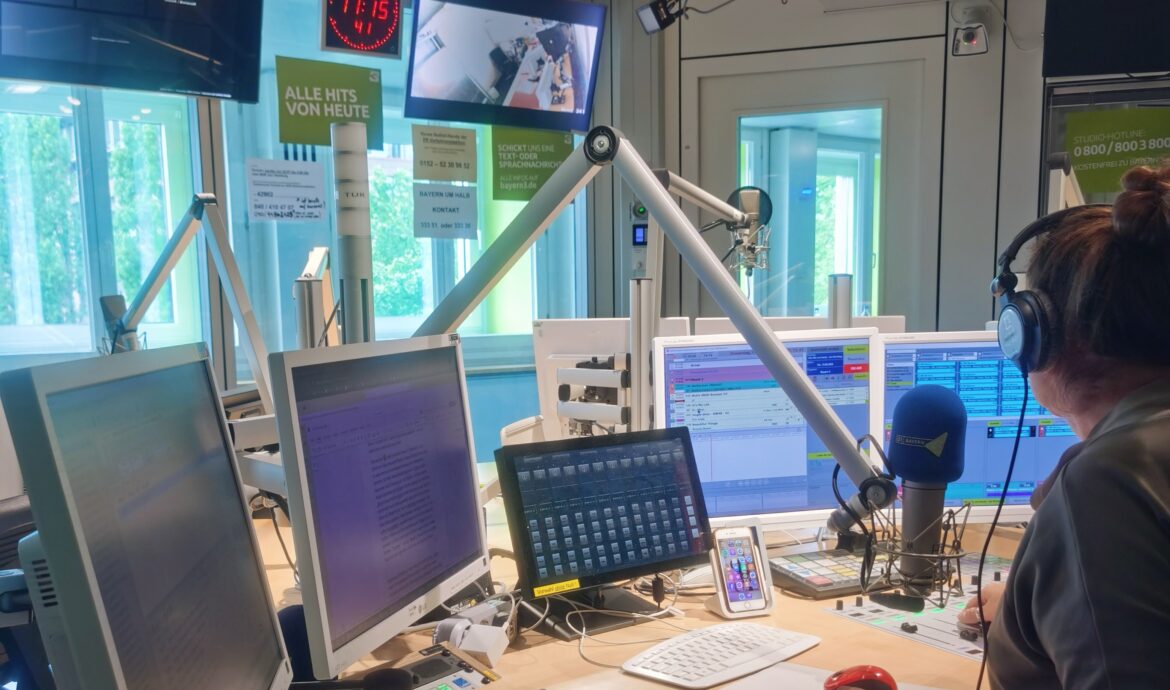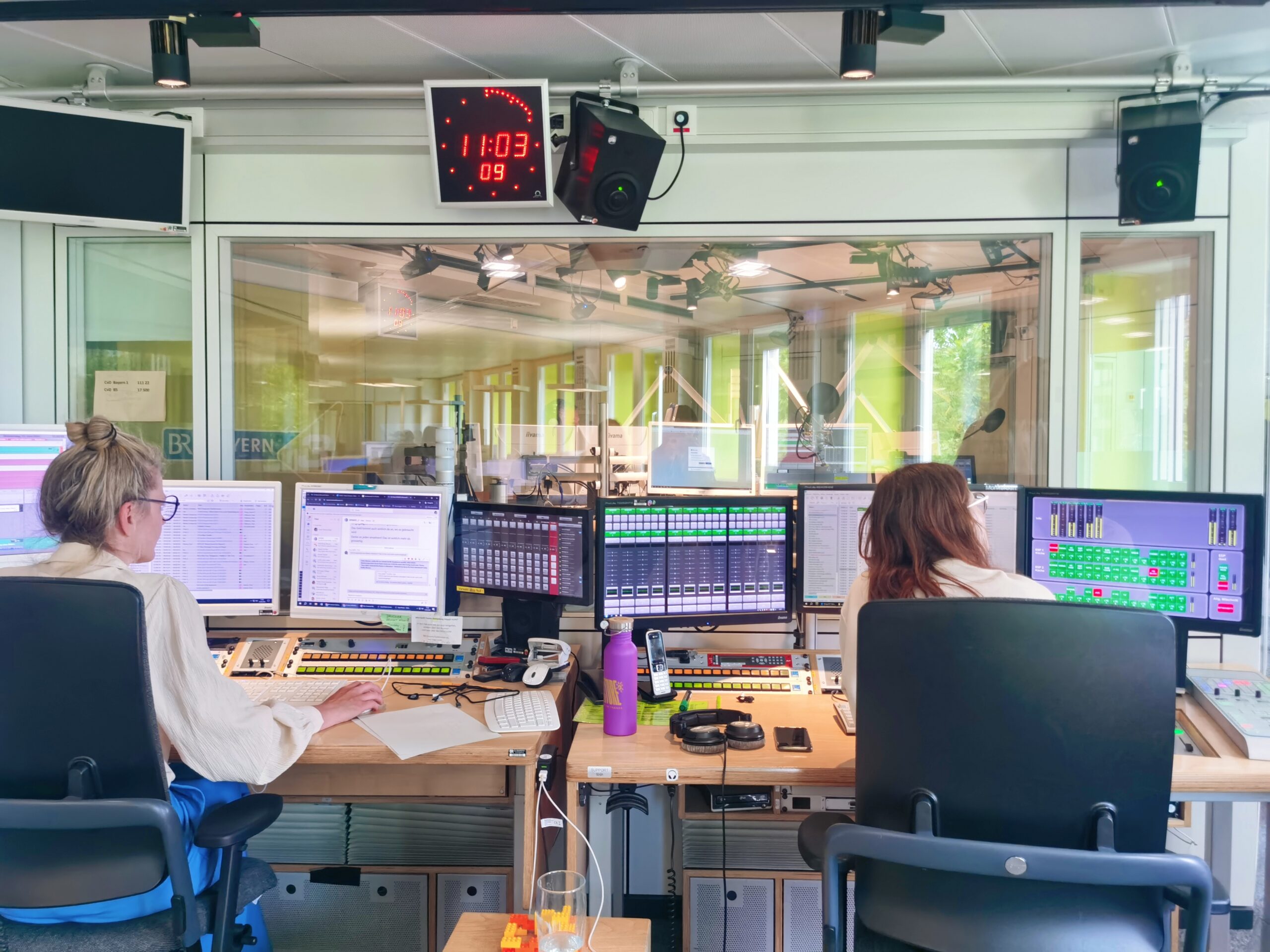
The changed and the unchanged: How Bayerischer Rundfunk has adapted to the digital age
MediaOur guided tour of Bayerischer Rundfunk (shortened to BR) started from the history gallery in the BR building, a long grey, silent and dimly lit gallery with the history of BR printed on the walls.


2021, 1991, 1971, 1949, 1945, 1934, 1929…. As we walked along the gallery, the time on the walls kept going backwards. The gallery seemed to be too long to see the end, just as the history of Bayerischer Rundfunk is so long that it goes far beyond the boundaries of our generation’s memory. Pointing to the pictures on the wall, our tour guide Bernd-Uwe Gutknecht, a journalist with over 30 years of experience said, “As you’re not familiar with our programme history, this doesn’t mean much to you. But if I bring German, especially like people that are 50 or 60 years old, they gonna say ‘Ah! Remember this one!’, you know, television stars, soap opera, stuffs like that.” Accompanied by Bernd-Uwe’s introduction, by the time we reached the end of the history gallery, which shows BR’s beginnings in 1922, I had a deep sense of the importance of BR and its profound influence on the public’s daily life in the history. But what about now? With more and more people turning to the internet rather than traditional media like radio and television for information and entertainment, how can BR remain relevant in this digital age? With this question in mind, we took the next step with Bernd-Uwe, a step that brought us from 1922 right back to the present day — We entered the workspace, where the staff, surrounded by bright lights and screens, were busily, passionately and energetically working. Through our conversations with several staff members, I came to understand how BR had adapted to the digital age. For BR, some things have changed significantly in the digital age, while some things always stay unchanged.
The changed
The way the staff works is changing. Almost every content producer has become more equipped with digital technology skills. In the workspace, the first person we visited was a host of a radio programme who was broadcasting live, speaking and adjusting various mechanical devices by hand at the same time. “This is kind of some pressure for her and she’s doing more or less everything by herself”, Bernd-Uwe explains, “20 years ago, there was a technician who did everything. But because we have to save money, so the hosts, they have to be DJ, they have to do everything by themselves. There is technical support if something happens, but it’s not that he or she does everything for her.” It’s not just radio hosts, but almost all the content producers at BR need to acquire more and more digital skills. Bernd-Uwe showed us the equipment used to produce and distribute news in the company, where a computer presents a database of densely packed entries into which journalists write news that is then adapted for various forms and distributed on various media channels, including radio, television, websites, and social media. In addition, Bernd-Uwe mentioned that some private radio stations in Germany already have some experiments with the AI radio DJs, hosts, speakers, which is a way forward. If BR starts to adopt this AI technology, this will bring further changes to the way the staff works.


BR’s content distribution channels are also constantly being updated. BR is constantly expanding its digital channels so that content can be distributed more effectively and BR can connect more effectively with the public. Bernd-Uwe said that most of their radio and TV content is now put online at the same time. In order for the radio and internet departments to work better together, and to save money, the staff here will be moving out of their current building next April, and the radio, TV and internet departments will share desks together. “I don’t know if it’s gonna work, but it’s the idea of our directors,” Bernd-Uwe said. Hearing Bernd-Uwe’s words, the colleagues next to him laughed. Bernd-Uwe then guided us to the production site of the podcast named True Crime, where a female host is talking to a lawyer. “This is one of the most downloaded podcasts that exists in Germany. So for us, it’s a big success.” Bernd-Uwe explained further that now podcasts are very important because a lot of people, especially young people, don’t listen to the radio any longer, but many of them have habit of listening to BR’s podcasts in the evening. Some of BR’s programmes aimed at young people such as Puls have stopped doing radio and are now focusing on podcasts and Youtube channels. “This may be the future of radio.” Bernd-Uwe concludes. Finally Bernd-Uwe takes us to talk to Cornelia, who is part of BR’s social media team and is responsible for responding to comments or messages from the public on various social media channels. “I think it’s nice to look back in time to see how things have changed. So before social media, you could only call in and criticize something or say something we would like to have covered on the radio. And otherwise, we were just sending out and we didn’t know if the people out there like it in real time.” Cornelia explains, “With community management and social media, we have direct channels on mail, Instagram, Facebook and WhatsApp where the community can talk to us and we can also take topics from the community and put them into the show.” “The link between social media and radio is very important”, Bernd-Uwe added, “especially during the pandemic when people had so many questions or complaints or comments to share with us. And we were so glad that Cornelia and her colleagues were here and communicated with the listeners, where maybe the most important department in the house I think.”
All in all, BR has changed a lot in terms of its organisational structure, the way it produces content and the channels it uses to communicate, whether proactively to increase its connection with the public or to save money under compulsion. Perhaps it’s no longer appropriate to call BR traditional media for BR has done everything the new digital media will do, and even better.
The unchanged
After the guided tour, Bernd-Uwe sat down with us at a table outside the building to talk more about BR, in which I understood what has remained unchanged in the midst of the constant changes of BR, that is, the social responsibility and the concern for all kinds of publics. Bernd-Uwe said, “we are here for the whole population in Bavaria.” That’s why BR produces content for all kinds of people, from under 16 to over 80 years old. And even though some of the content is aimed at a very small group of people, BR won’t give up on them. Bernd-Uwe mentioned a survey that found nowadays most of people are not able anymore to concentrate on one topic for longer than 1 minute and 30 seconds. In this context, BR has made a big push into short-form video platforms like Tiktok on the one hand, but on the other hand still insists on producing a lot of long programmes for those people who are still or will be interested in listening for over 30 minutes, even though this costs a lot of money. Bernd-Uwe mentioned that BR does a lot of things that don’t make money but cost a lot, such as BR24, some of the traditional radio channels, and that even though BR’s expenses have been higher than its income in recent years, they are unlikely to stop doing them because the public needs accurate, objective and comprehensive information, and because there are still a lot of older people who rely on these traditional radio channels a lot. As to how they are going to solve the financial problem, Bernd-Uwe says that they are currently focusing on saving money by optimising the way they work.

We said goodbye to Bernd-Uwe and left BR in the bright midday sun. On the underground to my dormitory, I looked through BR’s Youtube videos that are over 30 minutes on my mobile phone and found they were quite interesting. I think while the things that have changed makes BR better adapted to the digital age, the things that have stayed unchanged are perhaps even more the unique values of BR in this digital age. Wish BR a bright future.
Leave a Reply